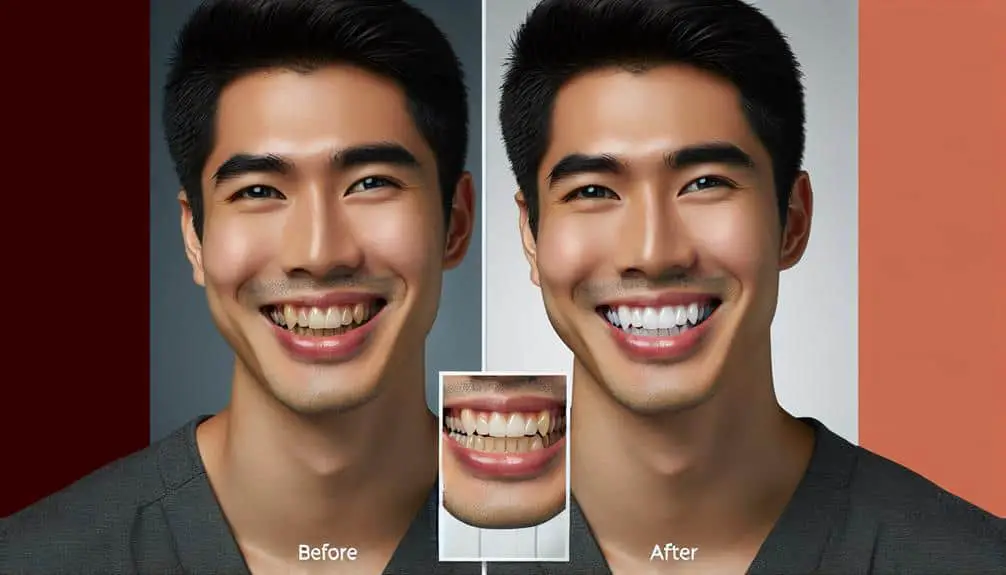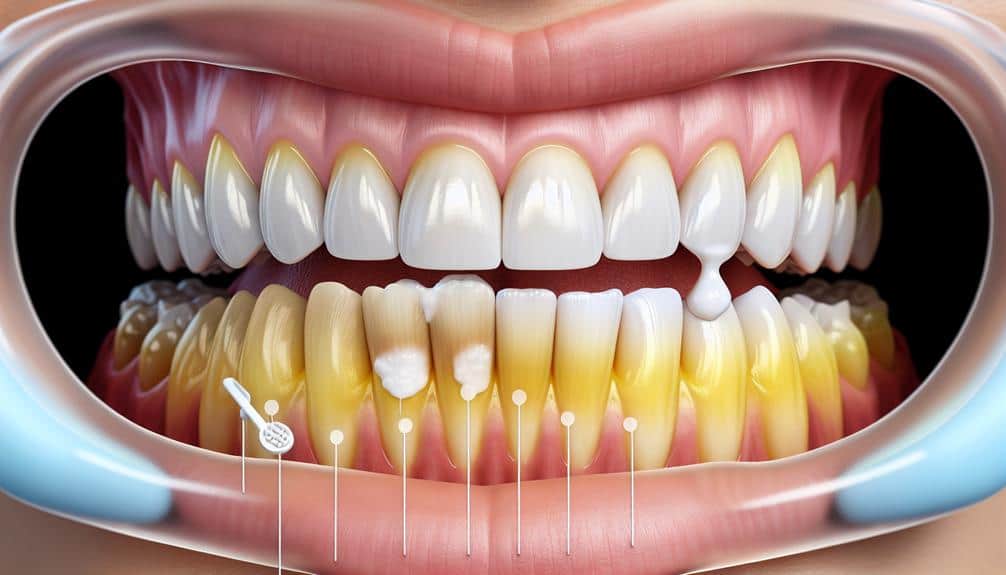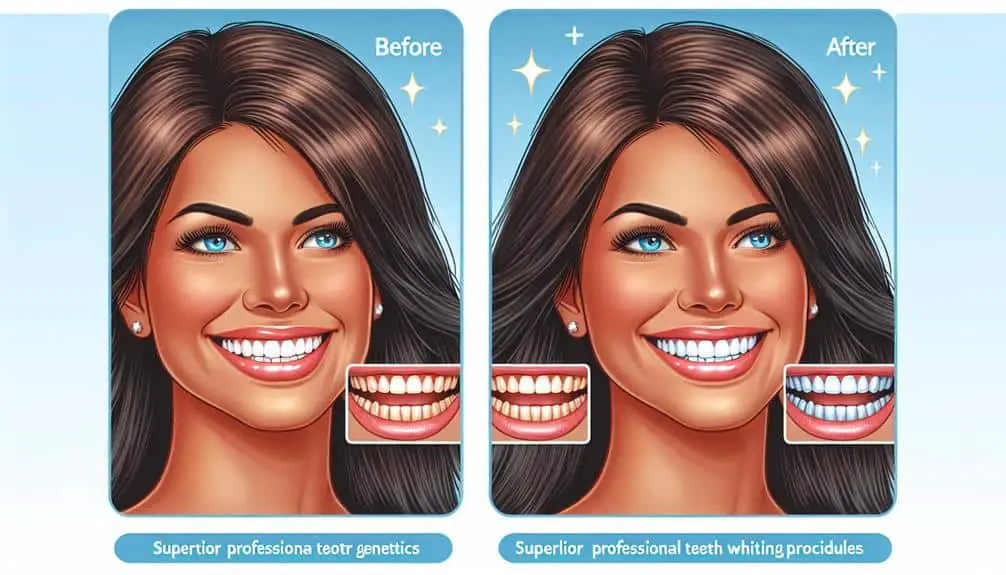Enhance your smile with genetic tooth discoloration whitening: 1) Choose clinically tested whitening products for safety and efficacy. 2) Maintain a consistent routine with whitening toothpaste and daily flossing. 3) Explore professional options like in-office treatments or custom trays. 4) Adjust your diet to include teeth-strengthening foods and avoid staining beverages. 5) Quit smoking and opt for whitening toothpaste with hydrogen peroxide. 6) Follow aftercare tips from your dentist for lasting results. 7) Schedule regular dental cleanings to monitor progress and address any issues. Keep your smile bright with these expert tips.
Key Points
- Consult with a dentist for personalized whitening recommendations.
- Use specialized whitening products designed for genetic discoloration.
- Implement a consistent oral care routine for optimal results.
- Consider professional whitening treatments for efficient outcomes.
- Be patient and persistent with whitening efforts for lasting effects.
Understanding Genetic Tooth Discoloration
If you've ever wondered why your teeth have a natural discoloration that seems resistant to traditional whitening methods, understanding genetic tooth discoloration can shed light on this common dental issue. Genetic causes play a significant role in determining the color of your teeth. Inherited traits passed down from your parents can affect the thickness of your enamel, the natural color of your dentin, and the overall appearance of your teeth.
Genetic tooth discoloration can manifest in various ways, such as a yellow, brown, or gray hue that's difficult to change with over-the-counter whitening products. These inherited traits influence how susceptible your teeth are to staining and how effectively they respond to whitening treatments. While environmental factors like diet and lifestyle also play a role in tooth discoloration, genetic predispositions set the foundation for the color of your teeth.
Understanding the genetic components of tooth discoloration is essential in selecting the most suitable whitening treatments that address the underlying causes. By recognizing the role of genetic causes and inherited traits, you can make informed decisions to effectively whiten your teeth and achieve a brighter smile.
Choosing the Right Whitening Products
To effectively address genetic tooth discoloration, selecting the right whitening products is crucial for achieving desired results. When choosing whitening products, prioritize product efficacy and safety. Look for products that have been clinically tested and approved by dental associations to make certain they're effective in reducing discoloration without causing harm to your teeth or gums.
Consider the cost of the products as well; some professional whitening treatments may be more expensive but could provide better and faster results compared to over-the-counter options. Accessibility is also key; opt for products that fit into your lifestyle and are easy to use consistently.
Before purchasing any whitening product, consult with your dentist to discuss which option would be best suited for your specific genetic tooth discoloration. Your dentist can provide personalized recommendations based on your oral health and the severity of the discoloration. Remember, investing in the right whitening products can lead to a brighter and more confident smile.
Consistent Whitening Routine Is Key
Maintaining a consistent whitening routine is essential for effectively addressing genetic tooth discoloration and achieving desired results. Daily habits play an important role in the success of your whitening efforts. Brushing your teeth at least twice a day with a whitening toothpaste can help prevent new stains from forming and maintain the results of any whitening treatments you undergo. Additionally, flossing daily can remove plaque and prevent discoloration in between teeth.
Incorporating lifestyle changes can also greatly impact the effectiveness of your whitening routine. Avoiding foods and beverages that are known to cause staining, such as coffee, tea, and red wine, can help preserve the whiteness of your teeth. Quitting smoking not only benefits your overall health but also prevents yellowing and discoloration of your teeth.
Professional Whitening Options
Considering professional whitening options can provide you with efficient and lasting results in addressing genetic tooth discoloration. In office treatments, such as laser whitening or professional bleaching procedures, are performed by dental professionals and can markedly lighten the color of your teeth in just one session. These treatments often use stronger whitening agents compared to over-the-counter products, leading to quicker and more noticeable results.
If you prefer a more gradual approach or want to maintain the results of in-office treatments, your dentist may recommend home remedies like custom-made whitening trays. These trays are filled with a whitening gel and worn over your teeth for a specified amount of time each day. While results may take longer to become apparent compared to in-office treatments, they can still effectively whiten your teeth over time.
Consult with your dentist to determine the best professional whitening option for your genetic tooth discoloration. They can recommend the most suitable treatment based on your individual needs and desired outcome.
Dietary Adjustments for Whiter Teeth
For improved tooth discoloration, making dietary adjustments can contribute to achieving whiter teeth. Natural remedies and essential options can play a significant role in enhancing the color of your teeth. Foods high in antioxidants, such as fruits like strawberries and apples, can help scrub away surface stains.
Additionally, crunchy vegetables like carrots and celery can stimulate saliva production, which aids in keeping teeth clean and white.
Lifestyle changes are also vital in maintaining oral health and promoting whiter teeth. Avoiding sugary drinks and foods can prevent tooth decay and discoloration. Instead, opt for water as your main beverage to rinse away food particles that could lead to staining.
Incorporating dairy products like cheese and yogurt into your diet can also be beneficial as they contain calcium and phosphates that help strengthen teeth and protect enamel.
Avoiding Staining Habits
To prevent tooth discoloration, it's important to be mindful of habits that can stain your teeth, such as smoking and consuming dark-colored beverages like coffee and red wine. Making lifestyle changes can play a significant role in preventing discoloration. If you smoke, consider quitting not only for your overall health but also for the appearance of your teeth. Reducing the intake of coffee and red wine can also help in maintaining a brighter smile.
Moreover, focusing on oral hygiene is essential in reducing staining. Brush your teeth at least twice a day with a whitening toothpaste that contains ingredients like hydrogen peroxide or baking soda. Flossing daily can help remove plaque and prevent stains in between teeth. Regular visits to your dentist for professional cleanings are also important in keeping your teeth free from discoloration-causing factors. By being mindful of your habits and prioritizing oral hygiene, you can effectively avoid staining and maintain a brighter, whiter smile.
Maintaining Whitened Teeth
To maintain the brightness of your whitened teeth, it's important to follow proper aftercare tips provided by your dentist.
Consistent oral hygiene practices such as brushing and flossing can help in preserving your results in the long term.
Remember that maintaining whitened teeth involves avoiding habits that can cause staining, ensuring your smile stays radiant.
Aftercare Tips
To effectively maintain the whiteness of your teeth after the whitening process, it's essential to follow a consistent oral care routine incorporating specific aftercare tips. After whitening, you may experience post-whitening sensitivity. To alleviate this, use a toothpaste designed for sensitive teeth and avoid consuming extremely hot or cold foods.
Maintaining good oral hygiene is vital in preserving your bright smile. Brush your teeth at least twice a day and floss daily to remove plaque and prevent staining. Avoid tobacco products and limit foods and drinks that can stain your teeth, such as coffee, tea, and red wine. Regular dental check-ups can also help in maintaining your whitened teeth and overall oral health.
Long-Term Results
Maintaining the whiteness of your teeth over the long term requires consistent oral care practices and lifestyle adjustments.
For effective whitening maintenance, it's essential to brush your teeth at least twice daily with a whitening toothpaste containing peroxide or baking soda to combat stains. Additionally, consider using a whitening mouthwash to help maintain the brightness of your smile.
Lifestyle changes such as avoiding foods and beverages that stain teeth, like coffee, red wine, and berries, can have a vital impact on the long-term results of your whitening efforts. Regular dental check-ups and professional cleanings are also essential to make sure that your teeth stay bright and healthy.
Frequently Asked Questions
Can Genetic Tooth Discoloration Be Completely Reversed With Whitening Treatments?
When it comes to genetic tooth discoloration, whitening treatments can help reduce stains. However, complete reversal may not always be possible due to underlying factors. Success rates vary, so consulting with a dentist is recommended for personalized treatment options.
Are There Any Long-Term Side Effects of Using Whitening Products on Genetically Discolored Teeth?
Using whitening products on genetically discolored teeth may pose potential risks. Long-term outcomes can include tooth sensitivity and gum irritation. Consult with a dentist for personalized advice and monitoring to minimize such effects.
How Can Genetics Play a Role in Determining the Effectiveness of Whitening Treatments for Tooth Discoloration?
How do genetics impact the effectiveness of tooth discoloration whitening? Genetic predisposition influences treatment outcomes. Inherited factors can dictate whitening success. Understanding your genetic makeup can help tailor whitening treatments for best results and long-term satisfaction with your smile.
Are There Any Specific Dietary Recommendations for Individuals With Genetic Tooth Discoloration Looking to Whiten Their Teeth?
To improve tooth discoloration caused by genetics, consider dietary restrictions like avoiding highly pigmented foods and beverages. Lifestyle changes, such as consistent dental hygiene and regular dental visits, can also support whitening efforts effectively.
Can Professional Whitening Options Provide Better Results for Genetic Tooth Discoloration Compared to At-Home Whitening Products?
Professional whitening options can provide superior results for genetic tooth discoloration compared to at-home products. Genetic factors play a role in whitening outcomes. Consult a dentist for personalized recommendations to achieve the most effective and lasting results.



